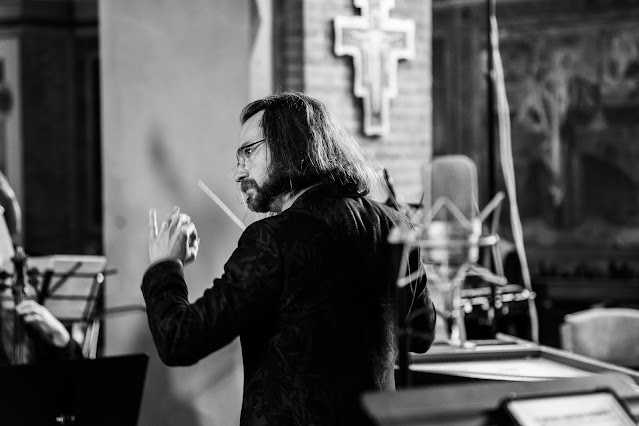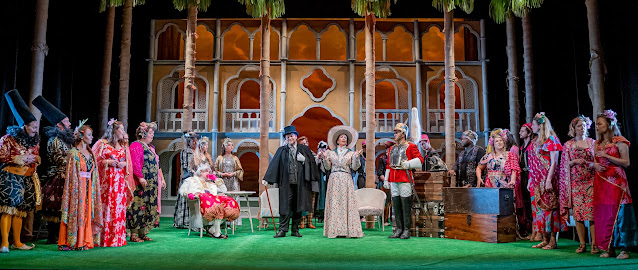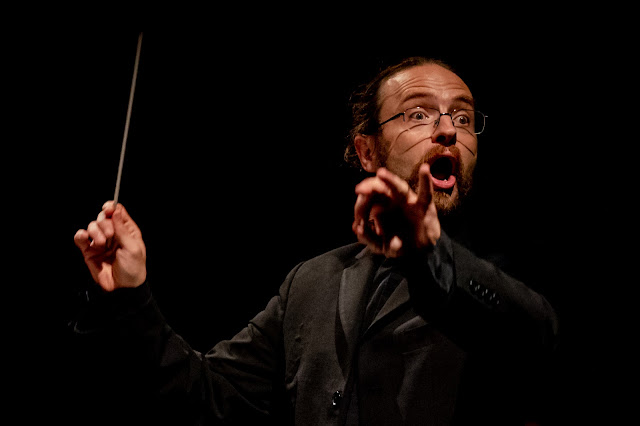 |
| Lampe: The Dragon of Wantley - recording sessions, John Andrews (Photo Matthew Johnson) |
The conductor John Andrews has had rather a Gilbert and Sullivan Summer. He conducted The Yeomen of the Guard at The Grange Festival, The Pirates of Penzance, Iolanthe and Utopia Ltd for the National Gilbert & Sullivan Opera Company in Buxton, and The Mikado for Charles Court Opera in Harrogate. And on disc, John's Sullivan without Gilbert explorations continue with the release of Sullivan's 1864 ballet, L'Île Enchantée with the BBC Concert Orchestra on Dutton Epoch. Also on disc, John has recorded a work that he sees as being, in many ways, a precursor to the Savoy Opera, John Frederick Lampe's Handelian parody, The Dragon of Wantley, on Resonus Classics with the Brook Street Band, Mary Bevan, Catherine Carby, Mark Wilde, and John Savournin [see my review].
Written in the 1730s, The Dragon of Wantley features finely Handelian-style music written by a composer who also played the bassoon in Handel's orchestra, allied to a crazy story that came from a 17th-century broadside ballad, about a dragon ravaging Yorkshire and it being vanquished, ultimately, by an unlikely beer-swilling hero.
The opera is not quite unknown, but it is certainly nowhere near as popular as it deserves to be, a fact that John finds somewhat puzzling. Many musicians know about it, and he has had plenty of conversations with musicians who have performed it and have happy memories of it, but somehow performances remain largely in universities and on Summer courses, though Peter Holman toured a production in the late 1970s.
But it deserves to be more well known, and it is a highly suitable piece for modern performance, featuring a small cast and good music, allied to the crazy plot. John sees it as representing a tradition of music that we have largely forgotten. That of the English composers writing for the stage at the same time as Handel, names such as Thomas Arne. And we don't quite know where to place the music.
The Dragon of Wantley, in many ways, looks forward to both pantomime and to Gilbert & Sullivan, but the music is of the school of Handel. John points out that we have come to accept and understand Shakespeare's middle-period comedies, with their lack of belly laughs and the balance between funny and serious, but that the 18th-century English musical tradition that has this combination of funny and serious is less well understood, and some of Handel's later works such as Serse and Partenope have similar problems for modern audiences.
The way The Dragon of Wantley combines humour with sophisticated music is in many ways close to Gilbert & Sullivan's operas. John describes Lampe's music as having an astonishing level of sophistication, whilst the libretto features low comedy and satire alongside more serious elements. He does wonder whether people are completely comfortable with the idea of mocking Handel's music. The thing in general about the 18th century is that we forget how much people did laugh.
 |
| Lampe: The Dragon of Wantley - recording sessions, John Andrews, John Savournin, Mary Bevan, Catherine Carby, the Brook Street Band (Photo Matthew Johnson) |
The work also looks back to the tradition of Purcell and post-Restoration theatre. Whilst the work of playwrights like Congreve had vanished from 18th-century theatre, Thomas Arne would set Congreve's libretto The Judgement of Paris [which John and the Brook Street Band recorded in 2019, see my review] shortly after The Dragon of Wantley was written, and both works seem to link 18th-century music theatre with post-Restoration theatre.
The work does also have challenges for contemporary performers. The use of the Da Capo aria is challenging for directors, the plot does not move much during the aria which is harder to handle in comedy. Also, directors need to choose a version of the opera. In the 18th century, all operas were pretty plastic, and John's recording is a conflation of the two surviving versions. Though he points out that we don't know whether there weren't further changes to the piece as well. For us, the score of an opera is the final, definitive version but in the 18th century it was a temporary staging post; at any time, the score applied to this cast and this theatre.
Almost certainly, when The Dragon of Wantley was toured in the 18th century it was performed heavily cut, and one of the surviving versions reflects this. All this means that a modern director needs to make lots of decisions about the work. Yet the work has resonance for modern-day performers, the jokes feel current. As with all good satire, it sits in the moment it was written but continues to land with people.
 |
| Gilbert & Sullivan: The Yeomen of the Guard - The Grange Festival (Photo Simon Anand) |
Having recorded The Dragon of Wantley in September last year, it is perhaps apt that John went on to spend so much time with Gilbert & Sullivan this year. He came to the Savoy Operas fresh as a conductor, he did not grow up with G&S and did not know the operas. Also, he has done lots of Sullivan without Gilbert (his recording of L'Île Enchantée is the latest in a sequence of recordings of Sullivan for Dutton Epoch) and has also recorded works by Gilbert created with composers other than Sullivan, such as Cellier's The Mountebanks [see my review]. So, he comes to G&S from these different angles, as well as from a familiarity with the operas of Donizetti and Rossini that had a big influence on Sullivan's music.
As well as conducting The Pirates of Penzance and Iolanthe in Buxton, John also conducted the late, and rarely performed operetta Utopia Ltd. This is the penultimate work that Gilbert and Sullivan wrote together, and it comes four years after The Gondoliers, years in which the two had had a serious argument. For John, the music is excellent, it is a beautiful score revealing Sullivan at the peak of his creative powers, and it uses a slightly larger orchestra which results in a richer sound. But by 1893, John does not think Gilbert and Sullivan were working well enough as a team, the sense of common purpose and direction is not as strong as in the earlier works.
For the performances in Buxton, director Jeff Clarke had edited the dialogue and the first act lasted around 1 hour and 20 minutes, but under Sullivan, this act lasted an hour and three-quarters. There was a lot of dialogue, with a lot of scenes that are there for their satirical potential, but which do not lock into the story, and it is almost moving towards a sketch show. The larger-scale drama is weak, so characters are brought in yet do not contribute.
 |
| Gilbert & Sullivan: Utopia Ltd - National Gilbert & Sullivan Opera Company(Photo Charles Smith) |
It is a fine work but requires creative handling. John feels that performing Utopia Ltd was rather like doing a first recording of a rare opera, you feel that you have to do it faithfully because it is so rarely performed. Yet is doing the work faithfully, the best way to do it? In Buxton, they had a fabulous production and it sounded good, but there is the possibility to present the work in a radically reordered form.
Sullivan's grand opera Ivanhoe (written in 1891, between The Yeomen of the Guard and The Gondoliers) is another opera where there is a case for not being overly faithful when performing the work. This is particularly true of the structure, which is rather static, and the work as written is huge and only an incredibly well-resourced theatre could consider performing it. John sees it as a candidate for remembering to have a look at a work and considering rethinking the way it is presented.
He points out that for many composers, the score is a work in progress. You only have to go back to Handel and see the changes he made for each revival. But this is hard to do once the composer is dead. This is not entirely rational, but an emotional response. Because the composer is not there to talk to, we tend to freeze the score in place. John feels that you have to put yourself in the position of a conductor, say, working on Sullivan's score whilst the composer is not able to be present. That is the mindset that he aims for.
 |
| Gilbert & Sullivan: Iolanthe - National Gilbert & Sullivan Opera Company (Photo Charles Smith) |
Of the works he conducted this Summer, John's favourite is The Yeomen of the Guard, a work that he first did 25 years ago. It is a score of subtlety and sophistication, and the way that the characters develop is powerful, with the dramatic journey of Jack Point and Elsie Maynard being a case in point. And John found that working with the director Christopher Luscombe on the dialogue brought out layers of subtlety. Also, it was nice to have the full Bournemouth Symphony Orchestra in the pit, as too often Sullivan's music is done with a small band. In The Yeomen of the Guard, this also helped to bring out the Wagnerian homages in the music. But all the G&S operas have things to love about them. For John, Iolanthe is one of the great British operas of the 19th century. It delivers a real emotional punch, and he wonders why it is not done in opera houses more.
Sullivan's 1864 ballet (written seven years before his first collaboration with Gilbert), L'Île Enchantée (which John has just recorded for Dutton Epoch) was written as a divertissement for Bellini's La sonnammbula at Covent Garden. At the time, it was standard practice for operas to have curtain raisers; Victorian ideas of a full evening's entertainment were rather different from ours. No choreographer nowadays would reproduce the ballet in the original narrative, but the score is glorious and showcases Sullivan's lyrical side. Often his theatre and instrumental music show off long lyrical lines, and the ballet is a strong score, demonstrating his mastery of orchestral colours. The piece also has a strong emotional trajectory, and its pacing is assured.
LewisForeman.JPG) |
| Arthur Sullivan: L'Île Enchantée - recorrding session, John Andrews, BBC Concert Orchestra (Photo Lewis Foreman) |
John's recordings of Sullivan have included Haddon Hall [see my review], The Light of the World [see my review], incidental music to Macbeth and The Tempest [see my review]. To come is John's recording of Sullivan's cantata The Martyr of Antioch, which premiered at the Leeds Triennial Festival in 1880. Interestingly there is both an oratorio version and a version for the stage. John was supposed to record the work in 2021, but this had to be postponed and it is now back in the schedules. John finds the work an interesting discovery and something quite different. It is later Sullivan (it comes between The Pirates of Penzance and Patience) and features a death scene, it is redolent of the high Romantic opera that Sullivan knew, and it showcases Sullivan as a composer of a highly dramatic oratorio. Also planned is a recording of Sullivan's The Chieftain, his 1894 re-working of his early operetta The Contrabandista.
Other work coming up includes a disc of piano concertos, including a new one by Errollyn Wallen plus works by Lutyens and Maconchy. This recording was originally planned for 2020 and is finally happening. He also has a disc of Poulenc planned with the Manchester Camerata, recording works for voices and chamber orchestra. In January 2023, John will be recording Ethel Smyth's second opera, Der Wald. Written between 1899 and 1902 and premiered in 1902 at Königliches Opernhaus in Berlin (now known as the Staatsoper Unter den Linden), this is a one-act work that John describes as 65 minutes of emotional turmoil. Unlike The Wreckers [which was performed at Glyndebourne this year, see my review] which is in three acts and long, Der Wald is far more compact, but it has the same style of fabulous music. Critics at the time described Der Wald as Wagnerian, but this simply is not true. There are a lot of late 19th century influences in the music and Wagner is just one of them. After all, she knew Tchaikovsky and he advised her to write operas.
 |
| John Andrews (Photo Jane Stokes) |
Never miss out on future posts by following us
The blog is free, but I'd be delighted if you were to show your appreciation by buying me a coffee.
Elsewhere on this blog
- A rare appearance in London, but a welcome one to be sure: Offenbach's La Princesse de Trébizonde from Opera Rara - opera review
- Celebrating 40 years on stage: Max Emanuel Cencic performs a programme of arias Handel wrote for the castrato Senesino - concert review
- Couperin's Trois Leçons de Ténèbres pour le Mercredi Saint at Bayreuth Baroque - concert review
- The Trocs go to the opera? Vinci’s Alessandro nell’Indie with five counter-tenors at Bayreuth Baroque Opera Festival - opera review
- The atmosphere, history & dangers of the sandbank: Michael Betteridge's Voices of the Sands - opera review
- A female pope, a lift, an angel and a demon: Edward Lambert's new opera The Burning Question reviewed by Florence Anna Maunders - opera review
- Devastating intensity: Elgar's The Dream of Gerontius at Prom 59 - concert review
- A light touch and some rattling good tunes: Puccini's La rondine from IF Opera at Belcombe Court - opera review
- Two moments in time: String Orchestra of Brooklyn with a work written for 2020's Lockdown, and another evoking the opening of Honolulu's contemporary art museum in 1980 - record review
- Warmth and humanity: British Youth Opera celebrates its 35th anniversary with Vaughan Williams' Sir John in Love - opera review
- The songs of William Busch: revealing the quietly distinctive voice of an underexplored composer - record review
- The curious case of Alan Bush's operas: enormously popular in East Germany in his lifetime, they remain unperformed and unexplored now - feature
- Home


.jpg)






%20Craig%20Fuller.jpg)


No comments:
Post a Comment